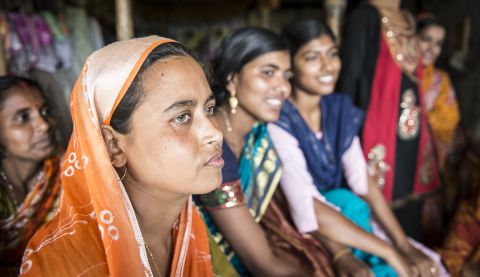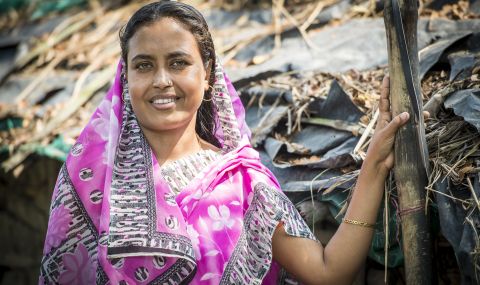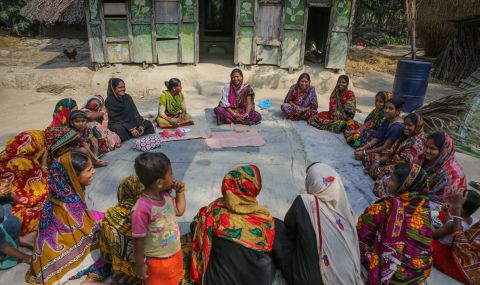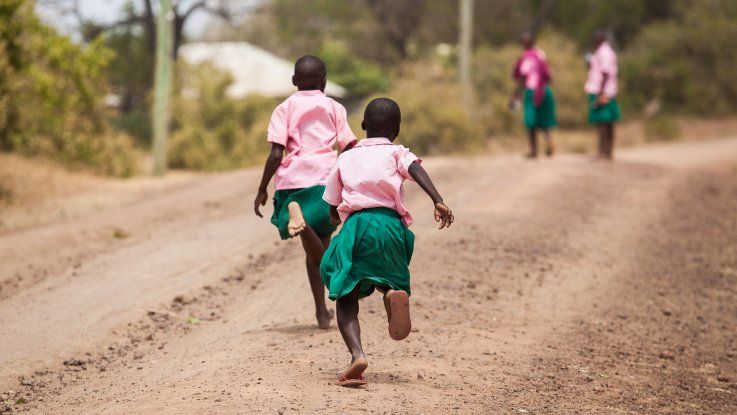Why women-only groups are vital
5 June 2017
Plans for women-only screenings of the Wonder Woman film premiere in the US and a festival primarily for black women in Paris have raised questions about the impact of dedicated spaces for marginalised groups. Some people have raised concerns that women-only groups may create even more division within society.

Women-only groups can make a huge difference to the lives of women and girls in poverty. Photo: ActionAid
At ActionAid, we have seen firsthand how safe, inclusive, women-only spaces, such as girls’ clubs, reflect circles and cooperatives, can offer refuge, as well as foster women's leadership, agency, and collective capacity to challenge issues like violence and abuse. Here are five examples.
1. Girls' clubs help girls learn what their rights are before it’s too late
In Kenya, for example, girls’ clubs teach schoolchildren how to fight against FGM and child marriage. Rose, who was thirteen years old when her father took her away to have FGM, managed to escape her marriage and is now a proud member of the girls' club at her school. “My little sister will not have the cut (FGM)... I’ll stop it,” she says, because she now knows it’s against the law.
Zeinab, who goes to an ActionAid girl's club in Zanzibar, Tanzania, says: “The best thing about girls club is when we sit together and talk about different things. When we sit together we talk about issues of violence and then there’s a suggestion box where we can write anything that we feel or what we’ve gone through and then it really helps a lot.”

10-year-old Zeinab (middle) and her friends Rahma (left) and Asha (right) all go to the girls club at their school in Zanzibar .
2. Safe spaces for women help violence be reported and punished
For many women who haven't had the opportunity to get an education, reporting a crime or filing a legal complaint is a real challenge. This means many terrible offences never get reported - despite laws existing to protect their rights. Reflect groups offer the support of trained paralegals to these women and bring them justice. These paralegals also push for policy change and reforms in legislation, monitor the implementation of laws, and challenge and hold governments accountable.
3. Women become independent – when they have their own space
Cooperatives offer women the opportunity to get new skills such as, reading, writing, farming and sewing. This can bring an economic lifeline to women who have been forced to rely on other people, or who are escaping abusive relationships. Cooperatives also give small loans to build a business, which can be paid back whenever the women are ready.
In 2010 Ajmira, from India, joined an ActionAid women's group with other Muslim women to gain independence in their communities and received training in areas such as domestic violence, land rights, sex and sexuality, and communication. Ajmira says: "Before the group I wasn’t able to move freely and I didn’t know the village well, for instance, where to buy certain things. Now that I’m no longer dependent on my husband I can move freely, visit my friends, go to the market. The ideal society would be when all the women are able to come out of their homes freely and work independently outside of their houses." She now chairs the group, which has 70 other members.

In 2010 Ajmira joined an ActionAid women's group with other Muslim women to help her gain independence in her community.
4. Emergency response work improves when women take the lead
One of the biggest outcomes of these women-only groups is that they now lead emergency responses, from damage and needs assessment through to procurement and monitoring of distributions. This model was first pioneered by ActionAid in Bangladesh, following the 2013 Cyclone Mahasen that destroyed more than 49,000 homes and devastated crops and livelihoods.
Some community members initially resisted to it, but with decision-making power and funds in their own hands, women were able to show how indispensable they were to emergency response programming.

Sabita Rani leading a training session on women’s leadership in Southern Bangladesh - one of the most disaster-prone areas in the world .
When Hurricane Matthew struck Haiti in 2016, women-led cooperatives leapt into action. They distributed water, soap and hygiene kits, targeted 2,300 people through cash for work schemes - to clean out gardens and roads, for example - and set up safe spaces for women in four communities, where they could talk about instances of violence and get psychological support.
They also ran training to empower women with the knowledge of how to protect themselves better. This reached 24,000 people, provided 500 households with rechargeable lamps and helped repair a workshop that normally employed 300 people.

Yayanne standing in front of houses destroyed by Hurricane Matthew in her community in Haiti. Yayanne works for one of ActionAid's local partner organisations and coordinated distributions of emergency supplies .
5. Boys and men are more engaged
These safe spaces also open the door to conversations about the issues with boys and men. In one Haitian village, violence against women has been completely eradicated. “Because of our training, the men respect women now. Before, every man beat his wife. It was normal. But now - nobody. To convince men was difficult, but we changed the way they see us.”

Johanne Moise, 28, has wiped out domestic abuse in her village through running several training sessions on women's rights with support from ActionAid .
Boys and men are also now becoming powerful ambassadors for women. In Somaliland, for example, men are campaigning against FGM; supporting groups to lobby governments to help pass anti-FGM laws and publically declaring that they will not marry women who have been cut.
How you can support women-only groups that change lives
ActionAid UK stands with the courageous women speaking out for change in their communities, as well as backing the grassroots women’s rights groups they lead.
Supporting women and girls as they claim their rights and lead their communities out of poverty is the most effective way of changing lives for good.


